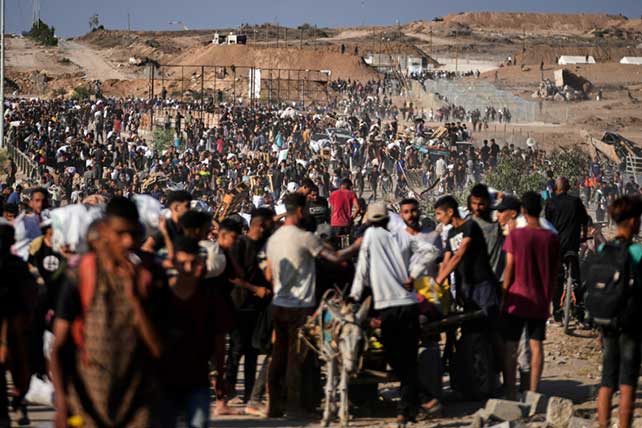Previously, the U.N. distributed aid through a coordinated delivery system with around 400 locations across Gaza, many controlled by Hamas.
Moore said the GHF was founded to prevent Hamas from stealing, stockpiling and selling the aid, for which Israel blames the U.N.
“GHF was designed from the very beginning to avoid the problem of the mass diversion of aid,” he said. “Unfortunately, our challenge is compounded by the fact that the United Nations, from really the top of the organization, and other NGOs are not getting their own aid where it needs to go.”
Palestinians carry bags filled with food and humanitarian aid provided by the Gaza Humanitarian Foundation, a U.S.-backed organization approved by Israel, in Khan Younis, southern Gaza Strip, on June 3, 2025. (AP Photo/Abdel Kareem Hana)
He said he has pleaded and begged the U.N. to help it carry out its mission.
“Just earlier today, about an hour and a half ago, I wrote another letter to the head of OCHA (the U.N.’s Office for the Coordination of Humanitarian Affairs), Tom Fletcher, who’s the head humanitarian official in the United Nations,” Moore said. “I wrote to him again and I expressed our alarm that there is all this U.N. aid that is sitting inside the Gaza Strip. There’s U.N. flour there that’s about to expire — the medical supplies that either have expired or are about to expire. Thousands upon thousands of pallets sitting in the Gaza Strip.”
Israel has mostly blocked the work of various U.N. agencies. In January, it banned the main U.N. agency for Palestinian refugees, the United Nations Relief and Works Agency, from operating in the country, alleging some of its employees were involved in the Oct. 7, 2023, Hamas attack on Israel that started the war. And on Monday, Israel refused to renew the visa of a senior U.N. official in the OCHA office.
Other humanitarian groups have declined to work with the GHF, saying they have concerns about its model of aid. No faith-based humanitarian group has yet to join forces with the GHF.
“The whole international system declines to work with us because of politics,” Moore said. “Despite everything that they say about being concerned about the needs on the ground, it is politics that is prevailing over the needs of these people.”
He did not deny that starvation is a fact in Gaza. The World Food Program has said the population of Gaza was at the brink of famine.
“The situation is real and the world needs to respond to it,” he said.
Moore concluded, saying: “I’m a Christian, an evangelical Christian. There’s nothing more Christian than feeding people.”
This article originally appeared here.


